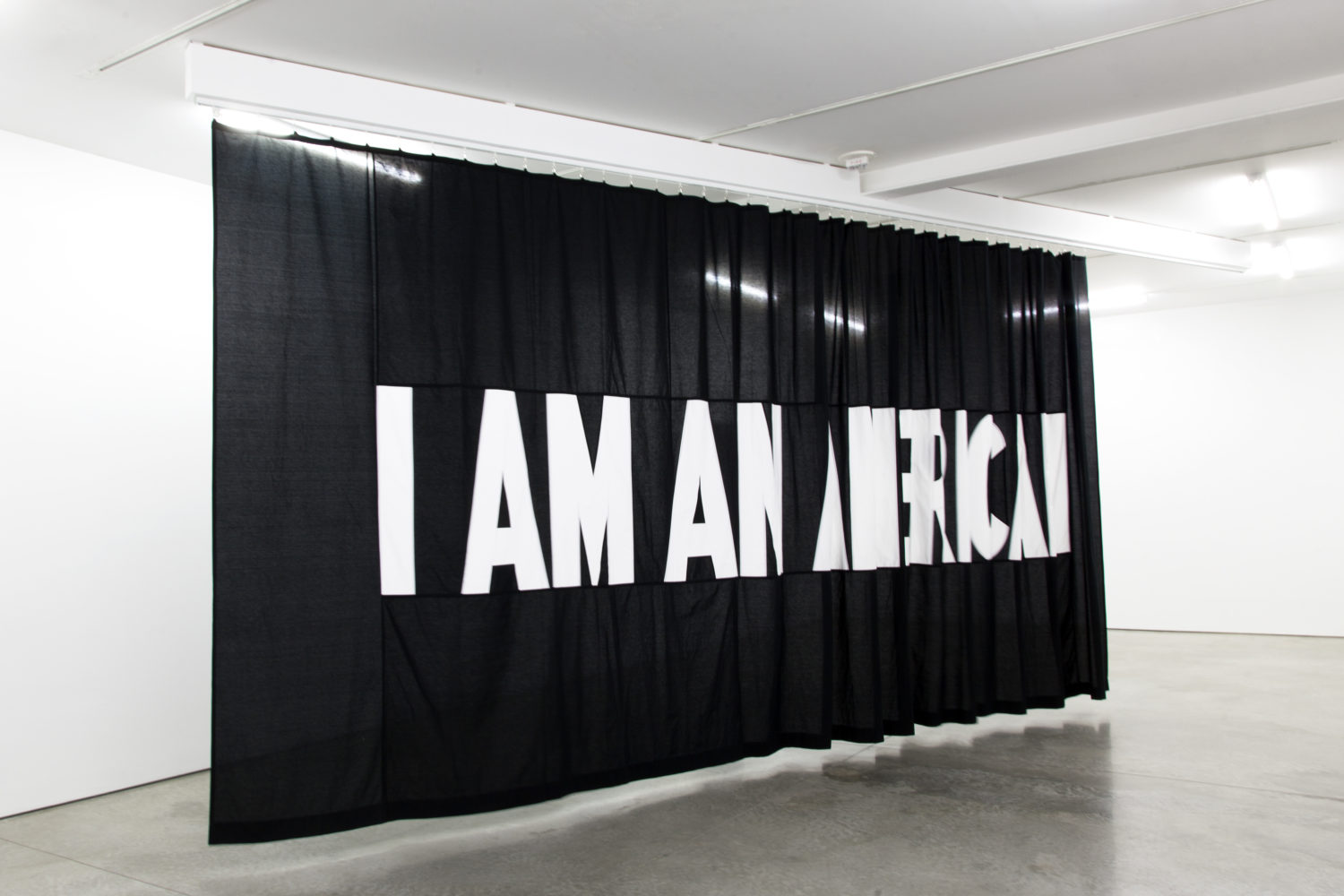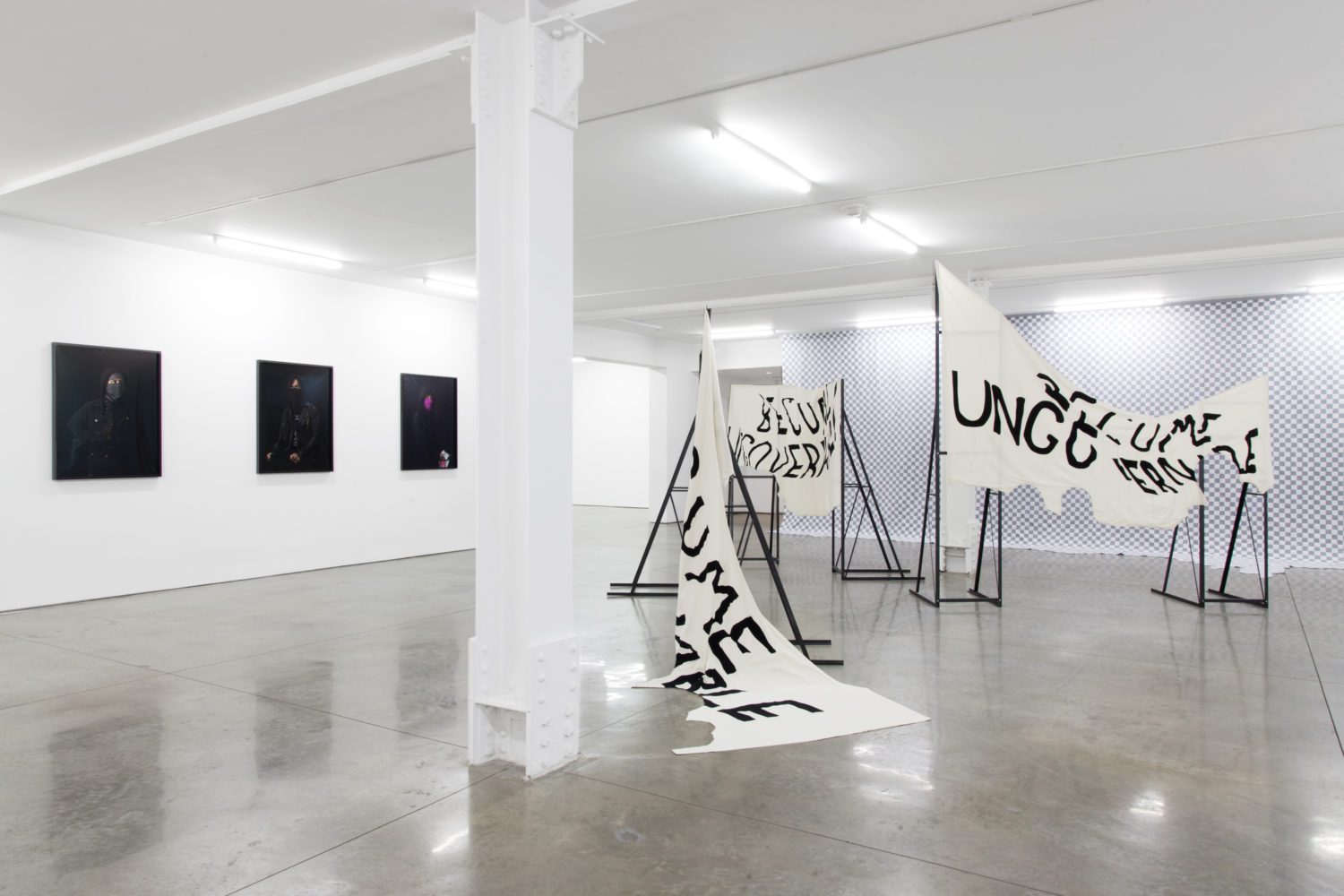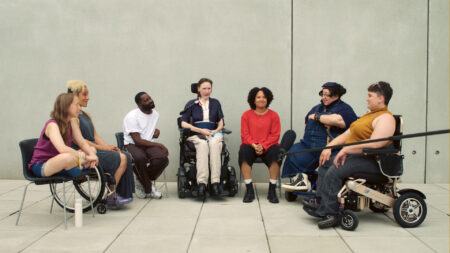Deep Focus
Cloth is a Battleground in Stephanie Syjuco’s “CITIZENS”

Stephanie Syjuco. CITIZEN (Portrait of S), 2017. Courtesy of the artist and RYAN LEE Gallery, New York. © Stephanie Syjuco.
In her latest exhibition at the Ryan Lee Gallery in New York City, Stephanie Syjuco continues her practice of investigating and questioning cultural objects. Here, she conducts a symbiotic analysis of the symbols that affirm or negate the idea of citizenship. Spread across the two rooms of the gallery space, the exhibition’s first noticeable aspect is the initially menacing-looking portraits that hang on the walls. Clad in historically subversive clothing, including balaclavas, leather jackets, and hoodies, a closer look reveals that the portraits depict young revolutionaries of color. As stated in the press release: “four staged portraits present black-clad, masked ‘protestors’ depicted by young UC Berkley students who are grappling with an uncertain reality and their own precarious status in the current political climate.” Each of the subjects is queer, a person of color, a woman, or undocumented. Their bodies and identities are simultaneously seen as threatening to a conservative nationalist ideology, and oppressed due to their marginality. Masks and other subversive garments symbolize this dichotomy, as they have become crucial for protesters by providing a sense of privacy from facial recognition technology while at the same time contributing to their perception as a threat.
The most telling of these portraits, Total Transparency Filter (Portrait of N), depicts a veiled figure hidden behind a checkered cloth. The pattern, taken from Photoshop’s grey and white transparency background, “translates a digital tool into material existence” and acts as conceptual camouflage against a white wall. From afar, it looks as if the sitter is wearing a niqab or a burka, modest Muslim garments that have been particularly contested in recent debates over privacy and public policy. Even more so than the hoodie, the hijab, burka or niqab, allow the wearer to create a wall between herself and the outside world. This private space created by cloth is often seen in the West as a threat to secularism, freedom, and even national security. The portrait, with its camouflaged textile that covers the sitter’s head, renders her simultaneously visible and invisible.

Stephanie Syjuco. Total Transparency Filter (Portrait of N), 2017. Courtesy of the artist and RYAN LEE Gallery, New York. © Stephanie Syjuco.
A dual use of textiles in contested spaces is present throughout the entire exhibition. In her recent book Fray: Art and Textile Politics, Julia Bryan-Wilson writes that there is an inherent tension to textiles. “They occupy a central place in traditionalist histories,” she notes, “while they also erupt as potential sites of resistance to that very traditionalism, claimed by competing factors at one hegemonic and counterhegemonic.”1 This dichotomy is elucidated by Syjuco’s two central pieces: Ungovernable and I AM AN… The latter, a 30″ × 40″ black cotton panel with the words “I AM AN AMERICAN” sewn on in white, occupies most of the exhibition’s second room. A reference to a sign posted by a Japanese American business owner following the bombing of Pearl Harbor, the image was memorialized in a photograph by Dorothea Lange. This piece alludes to the contested patriotism required in times of war—especially in the United States—and to the inherent racism that has helped build ideas of national identity and belonging.

Stephanie Syjuco. I Am An…, 2017. Courtesy of the artist and RYAN LEE Gallery, New York. © Stephanie Syjuco.
Contrarily, in the first room of the gallery stand three tattered white muslin banners with the words “BECOME UNGOVERNABLE” written on them in black. Inspired by iconic protest signs and reminiscent of hand-sewn suffragette banners, the piece adopts the phrase from anti-fascist protesters following the 2016 presidential election. In opposition to I AM AN…’s proclamation of patriotism, Ungovernable explores ideas of subversion in a fraught context, indicated by the ways in which the fabric is torn and in one instance, falls to the ground. In situations of oppression, it seems to say, it is necessary to dismantle the institutions that facilitate that oppression.
Taken as a whole, CITIZENS is an exploration of the ways in which meaning can change depending on the context in which it’s produced. The same symbols that are understood as peaceful and patriotic can be read as subversive in a different decade or by a different individual. Most importantly, textiles and cloth, inherently human in nature, can easily become signifiers of the battles over patriotism and identity that are fought in moments of political upheaval.

Stephanie Syjuco. Installation view of CITIZENS, 2017. Courtesy of the artist and RYAN LEE Gallery, New York. © Stephanie Syjuco.
Stephanie Syjuco: CITIZENS is on view September 7 – October 14, 2017 at Ryan Lee Gallery, New York.
1. Bryan-Wilson, Julia. Fray: Art and Textile Politics, Chicago: University of Chicago Press, 2017, p. 3.
